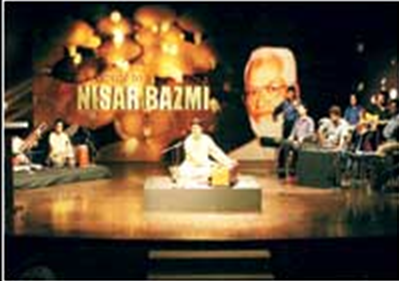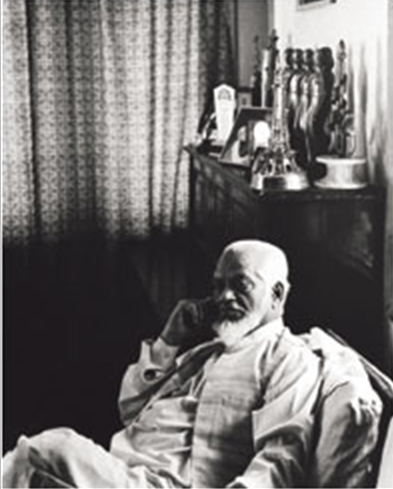Nisar Bazmi
This is a collection of articles archived for the excellence of their content. Readers will be able to edit existing articles and post new articles directly |
Nisar Bazmi
Bazmi bows out
By Omair Alavi
The undisputed king of Lollywood music in the 1960s and the ’70s, the musician Nisar Bazmi breathed his last on March 22, 2007, after a career that spanned six deacdes. Born Syed Nisar Ahmed in Bombay, India, in 1924 to a religious family, he had to change his last name to Bazmi after he got a job in All India Radio as a musician in 1939. He was offered his first film as a musician, Jamna Paar, in 1946 after all the songs he composed for the radio drama, Nadir Shah Durrani, became hits.
Overall, he composed songs for more than 40 films in India (Jaib Katra, Dagha Baaz Dost, Extra Girl, Khaufnaak Aankhein), 28 of which were released during his stay in the country while 12 others after his migration to Pakistan in 1962. The great Indian musicians, Laxmikant Pyarelal, were his assistants in India while the late playback singing legend Mohammad Rafi was said to have sung for Bazmi sahib for a fee of one rupee order to give him a break.
He migrated to Pakistan in 1962 and started his Lollywood career with Nazeer Sufi’s Head Constable (1964) while Fazal Karim Fazli’s Aisa Bhi Hota Hai (1965) was his first step towards stardom. After composing for moderately successful ventures such as Aadil (1966) and Waqt Ki Pukaar (1967), he got a chance to show his skills in Raza Mir’s Laakhon Main Eik, which was produced by Ejaz and had memorable songs from the then Mrs Ejaz, Madam Noor Jehan. The film had memorable tunes like Chalo aacha Hua, Badi mushkil se hua and Saathi kahaan ho. It was followed by Saiqa (1968), a Shamim Ara production, which got Bazmi sahib his first Nigar Award while Ali Zeb Productions’ Aag further polished his credentials as Pakistan’s best composer with Beetay dinoon ki yaadon ko, Yun zindagi ki rah mein, Mousam haseen hai, Liye aankhon mein ghuroor and Kuch kuch mujh se.
What followed was a blend of savvy, comprehendible and likeable songs in Jaise Jaantay Nahin, Andaleeb, Shama Aur Parwana, Anjuman, Noreen, Tehzeeb, Naagmani, Mohabbat, Meri Zindagi Hai Naghma, Mulaqat, Pyaasa, Aas, Anmol, Pyar Hi Pyar, Namak Haram, Intezaar, Mastaani Mehbooba, Laila Majnoon, Jagir, Shararat, Eisar, Dilruba, Talaash, Aansoo, Sachchayee, Intikhaab, Khaak Aur Khoon and Saima, from 1969 to 1980. His notable works beyond 1980 were A.H. Siddiqui’s Khushnaseeb (1984) for which Alamgir sang three songs for Nadeem after a long gap, Iqbal Kashmiri’s Hum Aik Hain (1986) which got him his fifth and last Nigar Award and Feroze’s Mohabbat Ho To Aisi Ho (1989) which was Mohammad Ali and Zeba’s last film together, the pair with whom Bazmi sahib worked extensively.
Partly due to the trend of going abroad to record Bollywood vocalists for Lollywood, and partly due to the negligence of our producers, Nisar Bazmi was forced into premature retirement. His last film was S. Suleman’s Very Good Duniya, Very Bad Loag in 1998, which saw him make a one-film comeback but after that he had no offer whatsoever. When I asked him about a possible comeback by me in a former interview, Nisar Bazmi said, “I am still the composer I used to be and I don’t think that I should go to producers for work. Agar woh mujhe is qabil samajhte hain to mujhe film dein gay because I have done quality work all my life and it is they who should come to me if they want me to give music for their films.”
He had the distinction of working with the greatest film directors of Pakistan, from star-makers Hasan Tariq (Anjuman, Tehzeeb, Umrao Jan Ada, Pyaasa, Laila Majnoon) to S. Suleman (Bewafa, Aag, Mohabbat, Jaise Jante Nahin, Intezar, Very Good Dunya, Very Bad Loag), the talented Raza Mir (Aasra, Anila, Laakhon Mein Aik, Naagmani) and Laeeq Akhtar (Saiqa, Naureen, Mulaqat, Mastani Mehbooba), the genius of Pervez Malik (Anmol, Pehchan, Talash, Dushman), Ali Sufyan Afaqi (Aas, Namak Haraam, Jagir, Aag Aur Aansoo), Farid Ahmed (Andaleeb), Shaiwan Rizvi (Meri Zindagi Hai Naghma) and Sharif Nayyar (Naz).
Be it Ahmed Rushdi, Noor Jehan, Mehdi Hasan, Ustad Amanat Ali Khan, Masood Rana, Mala, Nayyara Noor, Runa Laila, Alamgir, Naheed Akhtar, Saleem Shehzad, Tahira Syed, Tasawwur Khanum, Mujeeb Alam, Ikhlaq Ahmed, Ghulam Abbas, Asad Amanat Ali Khan, Anwar Rafi, Shazia Manzoor or Zille Huma, Bazmi sahib made the best singers croon for him. He introduced film star Nadeem as a singer in the unreleased Sehra much before he became an actor, and also gave Lollywood a nightingale in the form of Mehnaz, a singer with a difference such as Alamgir and many others.
Nisar Bazmi had the distinction of using both Ustad Amanat Ali Khan and his son Asad and Madam Noor Jehan and her daughter Zille Huma as playback singers, thus proving the longevity of his career. He eased out of the film industry in the ’80s and completely left it in the ’90s, but not after bagging the Nigar award for the best composer five times for Saiqa (1968), Anjuman (1970), Meri Zindagi Hai Naghma (1972), Khaak Aur Khoon (1979) and Hum Aik Hain (1986). He composed songs for nearly 100 films (70-plus in Pakistan) in his entire career which began with Jamna Paar in 1946 and ended with Very Good Duniya, Very Bad Loag in 1998.
He never regretted his decision to migrate to Pakistan and believed that he had received more from this country than he had given to it. His patriotic songs — Yeh Watan Tumhara Hai (Mehdi Hasan), Khayal Rakhna (Alamgir, Benjamin Sisters), Hum Zinda Qaum Hain (Tehseen Javed, Amjad Hussain, Fatima Jafri, Benjamin Sisters) and Aae Rooh-i-Quaid (Sajjad Ali, Benjamin Sisters), are still famous. His death, a month after that of his contemporary M. Ashraf, has left a vacuum that will always remain so.

